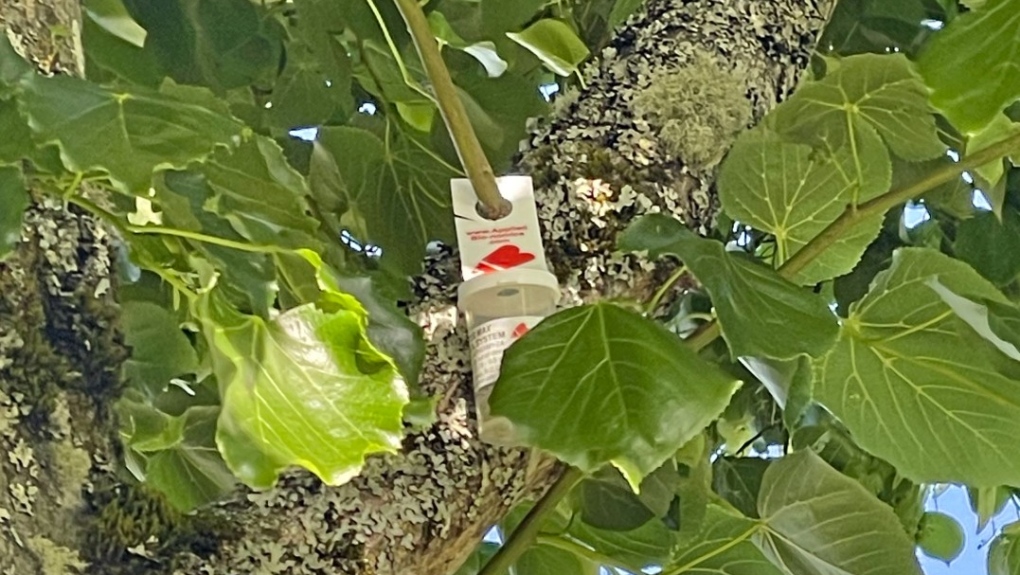Colwood releases thousands of ladybugs to protect trees and parks
 A ladybug clings to the edge of a Stone Crop Sedum leaf on Tuesday morning June 25, 2013, in Salina, Kan. (AP Photo / Salina Journal, Tom Dorsey)
A ladybug clings to the edge of a Stone Crop Sedum leaf on Tuesday morning June 25, 2013, in Salina, Kan. (AP Photo / Salina Journal, Tom Dorsey)
The City of Colwood has released thousands of aphid-eating ladybugs to help protect its trees, parks and shrubs.
Last week, the city said its parks team released the colourful insects around Colwood "as a way to manage the damage caused by pests such as aphids."
A single ladybug can eat as many as 5,000 aphids in their lifetime, according to the city.
"Ladybugs are an inexpensive and environmentally friendly alternative to harmful chemical pesticides," said the municipality in a release Tuesday.
Ladybugs can live up to two to three years, and hibernate in the winter when it's cold, staying alive by feeding on their own fat reserves.
The insects tend to sleep in the early morning when it's cool before becoming active in the sunshine.
Besides ladybugs, Colwood is also releasing aphid midges across the city, which eat aphids.
"The midges are more likely to stay put in windy locations, and are almost as voracious as the ladybugs, consuming 60 different species of aphids," said the municipality.
"Small pill-bottle sized containers of the wee beneficial midges are hung in the trees so they can make their way onto the leaves."
 A ladybug larve container is pictured in Colwood. Similar containers full of aphid midges are also hung in the city. (City of Colwood)
A ladybug larve container is pictured in Colwood. Similar containers full of aphid midges are also hung in the city. (City of Colwood)
CTVNews.ca Top Stories

Second Cup closes Montreal franchise over hateful incident
Second Cup Café has closed one of its franchise locations in Montreal following allegations of hateful remarks and gestures made by the franchisee in a video that was widely circulated online during a pro-Palestinian protest on Thursday.
‘It’s pretty emotional:’ N.B. family escape fire, plan to rebuild home
A family in Riverview, N.B., is making plans for Christmas and the future after escaping a fire in their home on November, 14.
Cargo ship runs aground in St. Lawrence River near Morrisburg, Ont.
A large cargo ship remains stuck in the St. Lawrence River after running aground on Saturday afternoon.
Scurvy resurgence highlights issues of food insecurity in Canada's rural and remote areas
A disease often thought to only affect 18th century sailors is reemerging in Canada.
B.C. man awarded $800K in damages after being injured by defective bear banger
A B.C. man has been awarded nearly $800,000 in damages as compensation for injuries he sustained from a defective bear banger, according to a recent court decision.
A man called 911 for help during a home invasion. Las Vegas police fatally shot him
A Las Vegas man called for police help during a home invasion before an officer fatally shot him, according to authorities and 911 calls.
Cat caught in hunting snare rescued by BC SPCA
Donations are ramping up for a BC SPCA cat with a mangled paw after being caught in a hunting snare, one of a rising number of pets to fall prey to the hunting device.
These royal residences are opening their doors this Christmas
Not so long ago, if you wanted to spend Christmas with the royal family, the only way to get close was to press your nose up to the TV screen during the monarch’s Christmas speech.
'Still working full time on it:' One year later police continue to search for gunman in Caledon double murder linked to ex-Olympian
One year after a couple was shot and killed in their Caledon home in what investigators have described as a case of mistaken identity, Ontario Provincial Police say they are still trying to figure out who pulled the trigger.

































